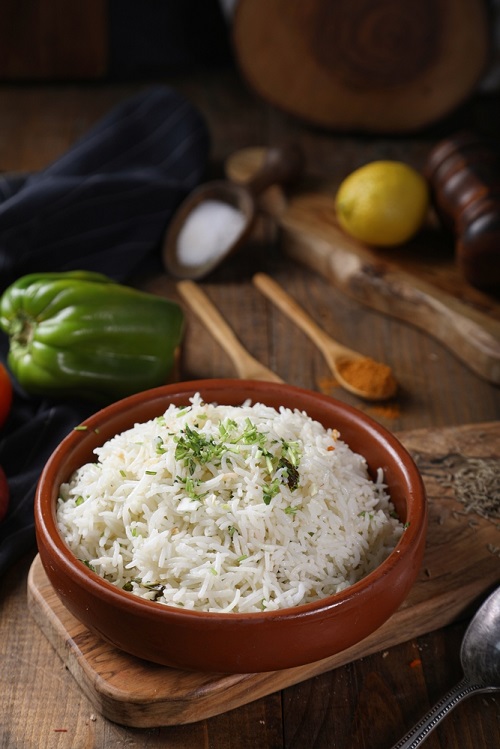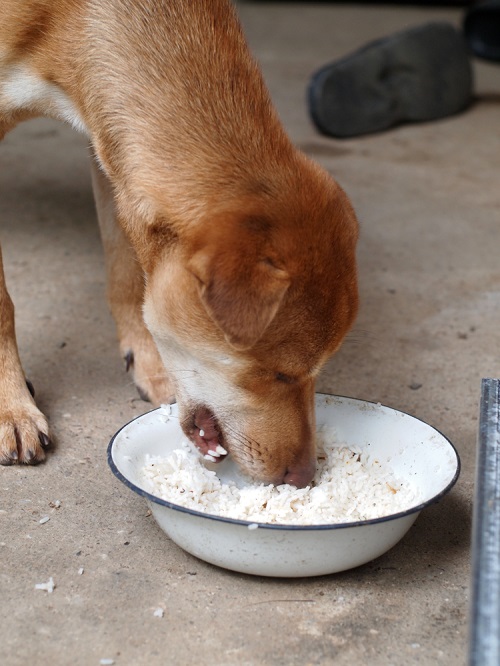Can Dogs Eat Rice? Can you make rice a part of their diet on a regular basis? Well, we have all the details to help you out!
If you are someone who loves to experiment with dog food and are wondering – Can Dogs Eat Rice, then you are at the right place! Time to find out the truth!
What Is a Rice?

Rice is a staple food for many cultures around the world. It comes from the grass species Oryza sativa or Oryza glaberrima and is grown in warm and humid climates, primarily in Asia, Africa, and South America. Rice is typically harvested and then processed to remove the husk, bran, and germ layers, leaving behind the white or brown kernel that is commonly used in cooking.
There are many different varieties of rice, each with its own unique flavor and texture, including long-grain, short-grain, basmati, jasmine, and wild rice. Rice is an important part of many cuisines around the world, including Asian, Indian, and Latin American cuisine.
Can Dogs Eat Rice?
Yes, dogs can eat rice, and it is a safe and easily digestible grain that can provide energy and nutrients to dogs. However, it’s important to ensure that the rice is cooked and plain, without any added seasonings or spices that may be harmful to dogs.
Is Rice Bood for Dogs?
Rice can be good for dogs when fed in moderation and as part of a balanced diet. Rice is a source of carbohydrates that can provide dogs with energy. It is also a gentle and easily digestible food that can be beneficial for dogs with upset stomachs or digestive issues.
Health Benefits of Rice for Dogs
Rice can provide several health benefits to dogs when fed in moderation and as part of a balanced diet. Some of the potential health benefits of feeding rice to dogs include:
- Source of carbohydrates: Rice is a source of carbohydrates that can provide dogs with energy and help them maintain healthy body weight.
- Easily digestible: Rice is a bland and easily digestible food that can be beneficial for dogs with upset stomachs or digestive issues.
- Source of fiber: Brown rice, in particular, is a good source of fiber, which can help to support digestive health and prevent constipation.
- Low in fat and cholesterol: Rice is low in fat and cholesterol, which can be beneficial for dogs with certain health conditions, such as heart disease or obesity.
- Gluten-free: Rice is naturally gluten-free, which can be beneficial for dogs with gluten sensitivities or allergies.
Can Dogs Eat Rice? A Few Health Concerns
Rice is generally considered safe for dogs to eat when fed in moderation and prepared properly. However, there are some potential health hazards associated with feeding rice to dogs, including:
- Arsenic contamination: Some types of rice, particularly brown rice, can be contaminated with high levels of arsenic, which can be toxic to dogs and humans alike. Arsenic can cause health problems over time if consumed in large amounts.
- Digestive upset: While rice is generally easily digestible, some dogs may have difficulty digesting it, particularly if they have an underlying digestive condition.
- Imbalanced diet: Feeding too much rice to a dog can cause an imbalanced diet, as rice lacks certain essential nutrients that dogs need, such as protein and fat. Dogs need a balanced diet that includes a variety of foods to maintain their health.
- Allergic reactions: Some dogs may have an allergy or intolerance to rice, which can cause symptoms such as itching, skin rashes, or gastrointestinal upset.
How to Feed Rice to Dogs?
- Choose the right type of rice: You can feed your dog white rice, brown rice, or another type of rice that you prefer.
- Cook the rice: Rinse the rice thoroughly and add it to a pot with the appropriate amount of water according to the package instructions.
- Cool the rice: Allow the rice to cool to room temperature before feeding it to your dog. Hot rice can burn your dog’s mouth and cause digestive upset.
- Serve the rice: You can serve the rice plain, or you can mix it with a small amount of cooked lean meat, such as chicken or turkey, or a small number of cooked vegetables.
- Monitor your dog: When introducing new food to your dog’s diet, it’s important to monitor them for any signs of digestive upset or other adverse reactions. Start with a small amount of rice and gradually increase the amount over time.
Remember to always consult with a veterinarian if you have any concerns about your dog’s diet or health.
Are All Rice the Same?
No, all rice is not the same. There are many different types of rice, each with its own unique characteristics, flavor, and texture. Some of the most common types of rice include:
- White rice: This is the most commonly consumed type of rice, and it has been milled to remove the bran and germ, leaving just the starchy endosperm.
- Brown rice: Unlike white rice, brown rice still has the bran and germ intact, giving it a nuttier flavor and a higher fiber content.
- Basmati rice: A long-grain rice that is commonly used in Indian and Middle Eastern cuisine, it has a fragrant aroma and a nutty flavor.
- Jasmine rice: A long-grain rice that is commonly used in Southeast Asian cuisine, it has a slightly sweet flavor and a soft, sticky texture.
- Wild rice: Not technically a type of rice, but rather a type of grass, wild rice is commonly used in North American cuisine and has a chewy texture and a nutty flavor.
There are many other types of rice as well, each with its own unique characteristics. The type of rice you choose to use will depend on the recipe you are making and your personal preference.
Can Dogs Eat White Rice?

Yes, dogs can eat white rice as long as it is plain and cooked. White rice is a safe and easily digestible grain that can provide energy and nutrients to dogs.
Can Dogs Eat Brown Rice?
Yes, dogs can eat brown rice. Brown rice is a good source of fiber, vitamins, and minerals. It can be a beneficial addition to a dog’s diet.
Does Rice Affect Taurine Levels In Dogs?
There is some evidence to suggest that feeding a diet that is high in rice can potentially lead to a deficiency in taurine in dogs, which can cause heart problems. Taurine is an amino acid that is essential for dogs, and it plays an important role in heart health.
While rice is not inherently harmful to dogs, diets that are high in rice and low in animal-based protein sources may not provide sufficient taurine levels. This is because animal-based protein sources, such as meat, fish, and poultry, are the primary sources of taurine in a dog’s diet.
Can Dogs Digest Rice?
Yes, dogs can digest rice. Rice is a source of energy for dogs and can be beneficial for dogs with digestive issues or upset stomachs because it is gentle on their digestive system.
However, it’s important to keep in mind that dogs digest rice differently than humans do, as they have a shorter digestive tract than humans, which means that they do not digest complex carbohydrates as well as humans do. Therefore, it’s important to feed your dog rice in moderation and as part of a balanced diet that includes high-quality protein sources, vegetables, and fruits.
Is Rice Good For Dogs With Diarrhea?
Rice can be good for dogs with diarrhea as it is gentle on their digestive system and can help to firm up their stools. Rice is a source of carbohydrates that can provide dogs with energy, and it is also a bland food that is unlikely to cause further irritation to their digestive tract.
When feeding rice to a dog with diarrhea, it’s important to choose a type of rice that is easy to digest, such as white rice or brown rice. Cook the rice thoroughly and serve it plain without any added seasonings or spices. You can also add a small amount of lean, cooked meat or cooked vegetables to the rice to provide additional nutrients.
Can Dogs Eat Uncooked Rice?
Uncooked rice can pose a choking hazard or cause an obstruction in a dog’s digestive system if they swallow it whole. Furthermore, uncooked rice can contain harmful bacteria or toxins that can cause food poisoning in dogs.
It’s important to always cook rice thoroughly before feeding it to your dog to ensure that it is safe for them to eat.
Can Dogs Eat Rice? Quick Takeaways
If you’re looking to include rice in your dog’s diet, it’s generally safe to do so in moderation. Cooked white rice is an easily digestible option, while brown rice offers additional benefits such as fiber. Basmati rice is also safe for dogs but should be fed in moderation.
Overall, rice can be a great source of energy and carbohydrates for dogs while also promoting good digestive health.
Please don’t forget to provide feedback by leaving a comment. We value your opinion and would appreciate any input you have to offer.

